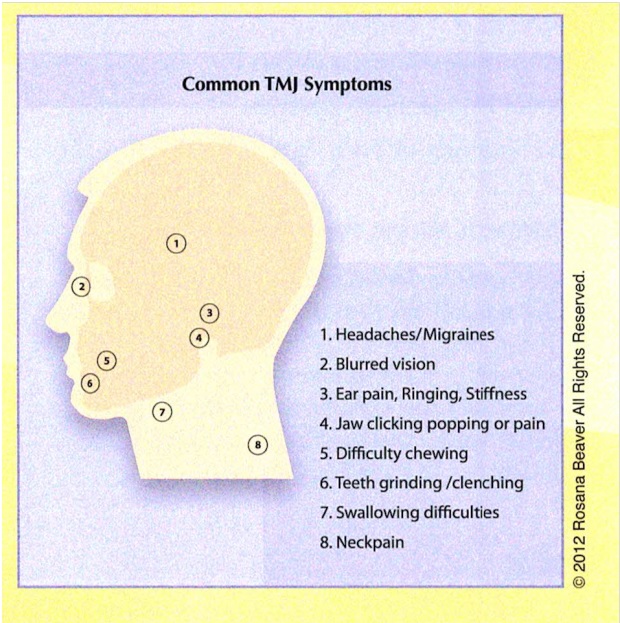
Headaches
The international Headache Society classifies headaches related to TMJ Disorder as tension headaches characterized by dull, deep and constant aches. Headaches may occur more often in the morning or varying levels throughout the day. Morning headaches may be related to night-time tooth clenching or grinding and have been known to coexist with common sleep disorders. Increasing pain during the day may be related to the effect of gravity on neck and head posture.
Face Pain (including sinus pain)
Pain in the sides of the lower jaw, or pain felt as "sinus" pain in the check or eye areas. Missing back teeth may result in a reduction of the height of the bite. When combined with daytime clenching due to stress, this can create muscle trigger points, muscle fatigue and pain. Ill-fitting/worn dentures may have loss of vertical support for the chewing muscles and may result in muscle spasm causing facial pain, headaches, neck pain, etc. due to improper jaw function.
Eye Pain
Pain in the eyes which may accompany headaches, can be caused by a TMJ disorder. It starts as a tightness in the skull's base region that spreads to the side of the head, ultimately creating pressure and pain in the eyes area.
Ear Symptoms
Pain, stuffiness and ringing in the ears (tinnitus) may be part of TMJ Disorder syndrome. The same nerves that supply a group of chewing muscles also supply the middle ear muscles. The shape, position and size of the upper and lower teeth directly affect jaw posture, and have been known to cause ear pain, stuffiness and pressure changes in adults as well as play a role in middle ear infection in children.
Other symptoms include:
- Dizziness
- Throat Pain
- Jaw Joint Noises (Clicking/Popping)
- Jaw Joint Locking (Open/Closed)
- Tooth Grinding/Clenching
- Limited ability to open mouth
- Inability to keep mouth open during dental procedures
- Blurry Vision
- Neck Pain
